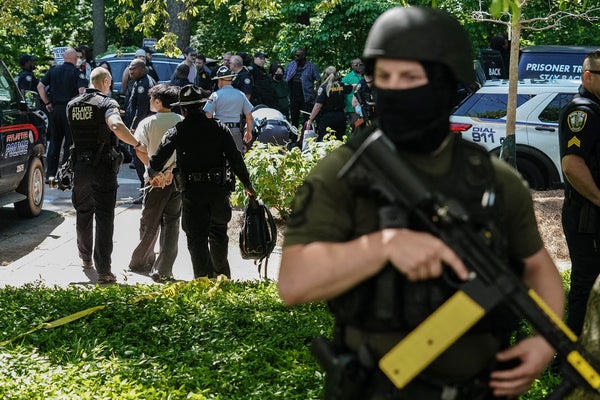University presidents and administrators can learn a lot from the student demonstrations that closed out this academic year.
Some lessons could be simply expedient. Most acutely: don’t get the chair of your philosophy department (in this case, me) arrested. That’s especially true when a video of her, looking like a model of respectability while being hauled off, might in the space of two days get 22 million views and become a serious public relations headache.
Another pragmatic lesson might be to clear encampments peacefully but quickly, since tents seriously interfere with commencement. More ambitiously, a president might try to negotiate with the demonstrators while simultaneously appeasing the governing board so as not to get fired.
On supporting science journalism
If you're enjoying this article, consider supporting our award-winning journalism by subscribing. By purchasing a subscription you are helping to ensure the future of impactful stories about the discoveries and ideas shaping our world today.
Such lessons in expediency boil down to keeping their job while facing wrath from all sides, including Congress. To make matters worse, doing all this involves negotiating millennia of religious strife that overflows to this day, while somehow maintaining their reputation against charges of antisemitism or “complicity in genocide.”
As that arrested philosophy department chair, I’d like to propose a more visionary lesson: If university presidents want to be on the right side of history, they should study how democracy works and the role that universities play in aiding democratic processes. They should see their job as foremost to educate their students to become engaged members of society—with the side benefit of furthering the democratic process itself. They should avoid doing anything that slows down or reverses democracy.
Other lessons for aspiring visionary leaders: When appropriate, engage with the demonstrators. Treat them like budding civic actors, not enemies. If protests are peaceful, let them proceed. Consider going to REI and getting a tent to camp out with the students. Listen to those involved. If the discourse and chants strike you and your board or alumni as offensive, bring in some experts on constructive dialogue. Arrange for some deliberative forums.
But whatever you do, do not do what my university did on the morning of April 25, 2024. Do not bring in outside police forces armed with pepper spray, rubber bullets and Tasers to violently and brutally dismantle a peaceful protest, all in a matter of minutes. Do not arrest bystanders like me and other professors and students who were calling for the police to stop and refusing to step away. Please don’t do any of that.
As a professor of political philosophy who has researched and written extensively on political deliberation and public life, the main lesson I’d like to impart is that this past season of protests is part of a larger political and democratic process. Such a season is not aberrant. Protests have a long and venerated history, and they are central to a well-functioning democracy. My book Fear of Breakdown: Politics and Psychoanalysis identifies protesting as one of several democratic practices central to even the most minimally functioning democracy. Protesting is a process of naming and framing issues, setting the agenda for more deliberative bodies to take up.
All told these practices help a large and diverse public identify pressing issues and begin to deliberate on possible courses of action amidst all the complexities and trade-offs involved. In such a process people begin to come to a public judgment, as the opinion researcher Daniel Yankelovich put it, on what courses of action and policies they are willing to support. Protest movement are a first step in creating such public will for sustainable public policy, action and change.
As the sociologist Jürgen Habermas, notes in his 1996 book Between Facts and Norms, established political systems rarely notice new and pressing public problems. More often it is social movements activists, including young people on campuses, who identify these issues and sound warning bells, demanding that neglected issues get put on the public agenda. As such, students have long been the conscience of our culture, bringing awareness to uncomfortable issues, often using language that older folks find discomfiting. From the rowdy margins of the public sphere, students and others have called on the larger political sphere to address massive problems, from the war in Vietnam to apartheid in South Africa.
This is what students at my university were trying to do on April 25 and in the days after. Whether or not we like or condone their chants, this is how democracy works. Unlike a merely expedient university president, a visionary one would understand and appreciate the democratic role of students in the public sphere. University leaders who think students need a more capacious understanding of the politics of the situation should work with the faculty to help create spaces for such learning. A visionary president would help nourish this kind of inquiry.
University websites and commencement addresses are full of high-blown language about educating students for political engagement and cultivating fearless inquiry. All that rings hollow now when these same university presidents condone the assault and arrest of their students for doing these very things. If one were more cynical, one might wonder whether these university administrative leaders, egged on by their often oligarchic governing boards and donors, were doing this on purpose. Perhaps they are actually opposed to democracy and aiming to educate students to be complacent in the face of injustice. I am close to being that cynical but not yet that despondent.
Let’s see what happens after this season of discontent. Maybe these lessons in democratic leadership might hold.
This is an opinion and analysis article, and the views expressed by the author or authors are not necessarily those of Scientific American.
